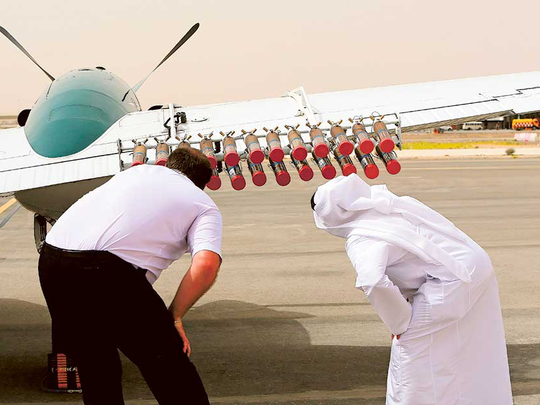
Abu Dhabi: Among the world’s top ten most arid countries with less than 100mm rainfall per year, the UAE is striving to capture every drop of rain in can wring from the clouds that pass over the desert nation.
A dedicated fleet of planes at Al Ain airport stand ready to fire salt flares into clouds in the hope that the increased condensation will yield some rain.
The process, called cloud seeding, is run by the UAE’s National Centre of Meteorology and Seismology (NCMS). Its forecasters monitor weather radars to tell pilots when to take off on rainfall-inducing sorties.
“As soon as they see some convective cloud formations, they launch us on a flight to investigate” to try “to seed the cloud”, Mark Newman, deputy chief pilot at NCMS, told AFP.
Speaking at the base for a fleet of four Beechcraft King Air C90 aircraft, Newman said summer is usually the busiest season.
That is when clouds form over the eastern Al Hajar mountains which deflect the warm winds blowing from the Gulf of Oman.
The strength of the updraft determines the number of flares fired as the plane explores the base of the forming cloud.
“If we’ve got a mild updraft, we usually burn one or two flares. If we’ve got a good updraft, we burn four, sometimes six flares, into the cloud,” he said.
Not all seeded clouds produce rainfall, but it happens often, Newman said.
The UAE is not the only country to make use of cloud seeding. US ski resorts in Colorado reportedly use the method to induce heavier snowfall. China also used rain dispersal technology to ensure dry weather during the opening of the 2008 Beijing Olympics.
Efforts to boost cloud seeding programme
Earlier this year, a Dh18.35 million international grant was launched by the UAE to help find innovative solutions to the fresh water scarcity problem.
The programme, also spearheaded by NCMS, is expected to boost the UAE’s ongoing cloud-seeding programme, a senior official at NCMS told Gulf News earlier this year.
The programme is expected to boost the UAE’s ongoing cloud-seeding programme, a senior official said. The cloud-seeding programme is relevant in the UAE as it has an arid climate with less than 100mm per year of rainfall, a high evaporation rate of surface water and a low groundwater recharge [that is far less than the total annual water used in the country], said Dr Abdullah Al Mandoos, Executive Director at NCMS and the UAE’s permanent representative to the World Meteorological Organisation.
“Furthermore, the population increase and economic expansion will put additional pressure on existing water supplies and rainfall in the country. This programme has been launched to address these concerns and to advance the development of sustainable approaches for providing water to arid and semi-arid regions across the globe,” Al Mandoos said.
“We are open to any technology or research that can produce more rain,” he said.
--With inputs from AFP












